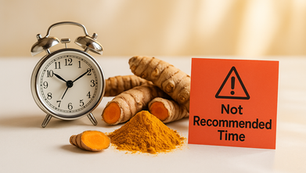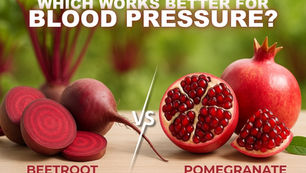top of page
Insights from Nature


Turmeric and Ginger: Double Anti-Inflammatory Power
When combined, turmeric curcumin and ginger’s gingerols and shogaols create a natural synergy that supports joint health, digestion, immunity, and even brain balance. Whether enjoyed in turmeric tea, taken as turmeric capsules, or sprinkled as turmeric powder and ginger in meals, this duo delivers real anti-inflammatory power — without the side effects often seen with conventional pain relievers.


Turmeric and Cayenne Pepper: Heat and Detox Synergy
Modern research now confirms that combining these two ingredients — turmeric and cayenne pepper — doesn’t just enhance flavor — it creates a synergistic effect that promotes circulation, metabolism, and overall vitality. Let’s explore how turmeric curcumin and cayenne pepper’s capsaicin work together to activate the body’s detox pathways, and how you can safely enjoy their benefits through turmeric supplements, turmeric tea, or turmeric powder in your daily routine.


Turmeric and Ginger, Cayenne Pepper, Ceylon Cinnamon, Beetroot, Garlic, and Black Pepper: How Herbs Enhance Curcumin’s Power
Turmeric (Curcuma longa), known for its rich golden hue and potent active compound curcumin. This guide explores how six natural partners — ginger, cayenne pepper, Ceylon cinnamon, beetroot, garlic, and black pepper — amplify turmeric’s power, based on scientific findings and traditional wisdom. These combinations form the foundation of some of the most effective turmeric supplements, turmeric capsules, and even functional beverages like turmeric tea blends available today.


Curcuma Longa (Turmeric) for Health: Ancient Root & Modern Remedy
Curcuma longa, better known as turmeric, has long held its place in ancient healing traditions, particularly Ayurveda in India and Traditional Chinese Medicine. But this vibrant yellow root has gone far beyond the kitchen and the temple—it’s now a central focus of scientific research and supplement innovation. From inflammation to metabolic health, turmeric’s renaissance in modern wellness is both evidence-backed and widely embraced.Whether used fresh in traditional cooking,


Roman vs German Chamomile: Which “Golden” Herb Suits You Best?
Why This Chamomile Comparison Matters to You. Imagine winding down after a long, stressful day. You pour yourself a steaming mug of chamomile tea, hoping for a peaceful night’s sleep. But did you know not all chamomile is the same? In the U.S., lovers of natural wellness often reach for “chamomile” without realizing there are two distinct species: Roman and German, each offering its signature benefits.


What Happens When You Start Taking Turmeric?
Curcumin, the active compound responsible for most turmeric benefits, supports joints and immunity to promote digestion and mood balance. If you’ve just begun adding turmeric to your daily routine, you might wonder: What actually happens inside your body — and how long until you notice results? This article outlines the typical timeline of effects based on human research, so you’ll know what to expect in the first few weeks and months.


Is Turmeric Good for Children? Science-Based Safety Guidelines
Turmeric (Curcuma longa) has gained attention for its anti-inflammatory, antioxidant, and immune-supportive properties. Is turmeric safe and effective for children? Scientific and pediatric research suggests that, when used appropriately, turmeric can be beneficial for children’s immune balance, gut health, and overall resilience — though certain precautions apply. This article explores how turmeric works in children’s bodies, its evidence-based benefits, and how to use it sa


Is Turmeric Good for Liver Health?
Turmeric (Curcuma longa), a golden-yellow spice used for centuries in traditional medicine, has drawn scientific attention for its hepatoprotective (liver-protecting) potential. Its primary compound, curcumin, exhibits powerful anti-inflammatory, antioxidant, and metabolic-regulating effects that help protect liver cells and support detox pathways. This article reviews the research and explains how turmeric may benefit liver health, as well as how to use it safely and effecti


What Diseases Can Turmeric Help Support?
Turmeric (Curcuma longa), the golden spice long used in traditional healing. Scientists are investigating how this natural ingredient may help support conditions linked to chronic inflammation — the root cause of many modern diseases. Let’s explore what research says about the diseases and body systems that turmeric curcumin may support, and how everyday forms like turmeric powder, turmeric tea, and turmeric capsules can fit into a healthy lifestyle.


Turmeric Curcumin: Proven Benefits for Immunity & Inflammation
Turmeric (Curcuma longa), the vivid turmeric root used in curries and herbal remedies. Modern clinical research has begun validating what traditional medicine has known for centuries — that turmeric curcumin helps calm inflammation, regulate the immune response, and support overall vitality. Whether it’s in turmeric powder, turmeric tea, turmeric capsules, or turmeric supplement form, this golden spice continues to shine in scientific literature.


Berberine and Ceylon Cinnamon: Your Weight Loss Power Couple
Berberine from Barberry and Ceylon Cinnamon from Sri Lanka have ancient roots. Berberine weight loss and Cinnamon synergy are trending for slim-down goals.Key Health Benefits of Berberine + Ceylon Cinnamon: Aids Weight Loss Berberine weight loss revs metabolism, while Cinnamon stabilizes blood sugar, Burns Fat Berberine Cinnamon fat burner targets stubborn pounds, Balances Blood Sugar, Boosts Metabolism and Herbal Slimming.


How to Use Turmeric for Weight Loss: Best Forms and Timing
Turmeric (Curcuma longa) has gained scientific recognition for its potential role in supporting weight management through its active compound, curcumin. But understanding how to use turmeric correctly — in the right form, amount, and combination — is essential to experience real results. This article explains practical, evidence-based ways to use turmeric for weight loss, including dosage, ideal timing, synergistic pairings, and daily preparation methods that maximize absorpt


How Long Does It Take for Turmeric to Work for Weight Loss?
One question arises frequently: “How long does it actually take for turmeric to work for weight loss?” The answer depends on multiple factors — dosage, form, diet quality, exercise, & how consistently it’s used. While turmeric is not a quick fat-burning solution, its gradual metabolic effects have been confirmed by numerous clinical studies. This article examines how long turmeric takes to produce visible results, what happens in the body during that time & how to optimize i


Does Turmeric Reduce Belly Fat?
Scientists now understand that excess abdominal fat increases the risk of insulin resistance, heart disease, and other chronic conditions. In recent years, turmeric (Curcuma longa) has attracted attention for its potential role in metabolic and fat regulation. This article examines what scientific evidence says about turmeric’s effect on belly fat, how it works in the body, and how to use it safely for best results.


Turmeric for Weight Loss: What Science Says
Turmeric (Curcuma longa) stands out for its dual action — supporting both inflammation balance and fat metabolism. Curcumin, turmeric’s main bioactive compound, has been investigated for its role in reducing body fat accumulation, improving insulin sensitivity, and supporting healthy metabolism. This article reviews current research on turmeric and weight loss, explaining how it works, what studies have found, and how to incorporate it effectively into a balanced lifestyle.


Is Turmeric Good for Arthritis? What Science Says About Curcumin?
Arthritis affects millions of adults globally, leading to chronic pain, stiffness, and limited mobility. While conventional medications such as NSAIDs (like ibuprofen) provide short-term relief, long-term use can cause digestive or cardiovascular side effects. This has led many people to explore turmeric (Curcuma longa), a natural herb known for its anti-inflammatory and antioxidant properties. But is turmeric truly effective for arthritis?


When Should You Not Take Turmeric?
Turmeric (Curcuma longa) is a golden spice valued for centuries for its support in inflammation balance, metabolism, and immune health. Its main bioactive compound, curcumin, provides powerful antioxidant and cellular protection benefits. However, there are times and health conditions when taking turmeric is not recommended. Understanding when to avoid it helps prevent unwanted interactions and ensures that this herb supports your body safely. Why Turmeric Isn’t Always Safe f


What Does Mayo Clinic Say About Taking Turmeric Root?
Turmeric (Curcuma longa) has become one of the most researched herbal ingredients in modern health science. It’s praised for supporting inflammation balance, joint comfort, and overall wellness. But what do medical institutions like the Mayo Clinic actually say about turmeric and curcumin supplements? This article summarizes Mayo Clinic’s professional guidance, along with scientific findings from NIH and peer-reviewed studies, to help you understand how to use turmeric safely


Turmeric and Blood Pressure Drugs: What Research Reveals
Turmeric is a well-known herbal supplement praised for its anti-inflammatory, antioxidant, and circulatory benefits. Many people who take blood pressure medication also use turmeric for joint health or general wellness. However, combining turmeric or its active compound curcumin with antihypertensive medications may cause unexpected effects. This article explains the scientific evidence, potential risks, and safe ways to use turmeric if you’re taking blood pressure medicine.


Who Should Not Take Turmeric or Curcumin?
Turmeric is a well-known spice and herbal supplement recognized for its anti-inflammatory and antioxidant properties. While turmeric is safe for most people when used in food, not everyone should take turmeric or curcumin supplements, especially in high doses. Certain health conditions and medication combinations can make turmeric unsafe or require professional supervision. Understanding these risks helps ensure turmeric is used effectively and responsibly for long-term welln


Beetroot Nutrition Facts and Daily Intake Guide
Beetroot is far more than a colorful root vegetable — it’s one of nature’s richest sources of nitrates, antioxidants, and essential micronutrients that support circulation, metabolism, and energy.From vitamins and minerals to betaine and betalains, beetroot offers a unique nutrient profile that promotes long-term cardiovascular and metabolic wellness. This article explains beetroot’s full nutritional composition, its scientifically proven benefits, and practical daily intake


How to Eat Beetroot Daily Without Getting Bored
Beetroot has earned a reputation as a heart-healthy superfood — but how can you realistically eat it every day without tiring of its earthy flavor or complex preparation?The good news: beetroot’s natural sweetness and versatility make it easy to incorporate into both meals and supplements. Whether you enjoy fresh juice, smoothies, roasted dishes, or capsules, there are convenient ways to enjoy its benefits daily while maintaining balance and variety.This article shares practi


Pomegranate vs Beetroot for Blood Pressure: Which Works Better?
Beetroot and pomegranate are two of the most studied natural foods for cardiovascular support. Both are packed with antioxidants and bioactive compounds that help maintain healthy blood pressure, vascular function, and heart circulation.Yet, they work through different biological mechanisms: • Beetroot increases nitric oxide to relax blood vessels, • Pomegranate protects the endothelium and reduces oxidative stress that can damage arteries. This article compares the two bas


Fennel vs Anise: The Complete Guide to Two Licorice-Like Herbs
If you have ever bitten into an Italian biscotti flavored with anise or tasted the subtle sweetness of roasted fennel in a Mediterranean dish, you know how easily these two herbs can fool the senses. Both share that unmistakable licorice-like flavor, yet they come from different plants with distinct histories, appearances, and culinary roles. In American kitchens and health stores, fennel and anise often get confused, especially when it comes to seeds, teas, or herbal supplem
bottom of page